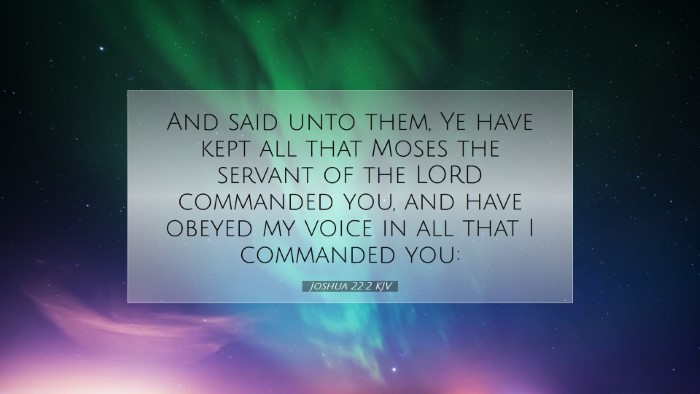Commentary on Joshua 22:2
Joshua 22:2 reads: "And said unto them, Ye have kept all that Moses the servant of the Lord commanded you, and have obeyed my voice in all that I commanded you."
Context and Background
The passage occurs at a significant juncture in Israel's history as they settle into the Promised Land following years of wandering. The tribes of Reuben, Gad, and the half-tribe of Manasseh have fulfilled their commitment to assist in the conquest of Canaan and are now ready to return to their families and inheritances on the eastern side of the Jordan River.
Historical Significance
This verse reflects an important moment of transition for the Israelites, emphasizing gratitude and recognition for the faithfulness of the tribes who have fought alongside their brethren. Acknowledgment of obedience is central to covenantal relationships in the biblical narrative.
Thematic Insights
The message of this verse highlights several key themes important for theological reflection:
- Obedience: The commendation of the tribes serves to underscore the biblical virtue of obedience to God’s commands as conveyed through spiritual leadership.
- Covenantal Loyalty: The loyalty of the tribes who remained faithful to their promises reflects the broader principle of fidelity within the covenant community.
- Encouragement and Acknowledgment: Leaders in the faith community are called to recognize and encourage those who have remained faithful in their duties.
Commentary Insights
Drawing from public domain commentaries, we can find rich insights into this passage:
Matthew Henry’s Commentary
Matthew Henry emphasizes the importance of accountability and the necessity of keeping one’s word. He notes that Joshua's acknowledgment serves as an important reminder to uphold promises made to God and to one another. Additionally, he reflects on how this moment encourages a culture of remembrance, urging the people to recall the commands of God as they move forward into their new life. It serves as a model for leaders today who are tasked with guiding others in obedience to divine principles.
Albert Barnes’ Notes on the Bible
Barnes provides further reflection by highlighting the collective effort of the Israelite tribes in taking possession of Canaan. He stresses that the actions of the tribes of Reuben, Gad, and Manasseh should be seen not merely as individual acts of loyalty but as part of a larger divine plan. Their obedience was pivotal for the success of an entire community, reminding present-day believers that their actions influence the entire Church body. Barnes’ examination helps illuminate the interconnectedness of the church community in the early biblical narratives.
Adam Clarke’s Commentary
Clarke focuses on the character of the leaders who affirm the obedience of their followers. He discusses how this commendation is rooted in the larger narrative of faithfulness to God. Clarke emphasizes the moral lesson that leadership entails recognizing and expressing gratitude towards those who faithfully fulfill their commitments. He explicitly connects this passage to the overall theme of God rewarding faithfulness, suggesting that such acknowledgment builds unity and encourages further dedication among God’s people.
Practical Applications
The practical applications derived from this verse resonate with pastors, students, theologians, and Bible scholars alike:
- Encouragement of Obedience: Faith leaders are encouraged to cultivate a culture that values obedience to God’s will. Calling attention to the faithful acts of congregation members fosters an environment where obedience is celebrated.
- Importance of Recognition: Leaders should actively recognize and affirm the contributions of others in ministry, modeling gratitude as a biblical practice.
- Covenantal Relationships: Strengthening bonds within the community of faith reflects a commitment to the broader mission of the Church as the Body of Christ, promoting unity and shared purpose.
Conclusion
Joshua 22:2 serves as a powerful reminder of the value of obedience, the importance of acknowledgment, and the interconnectedness of the faith community. By reflecting on insights from public domain commentaries, we gain a deeper understanding of the implications of this passage for both historical context and contemporary application. It encourages us to nurture an environment of faithfulness and gratitude, essential for the growth and strength of the Church today.


